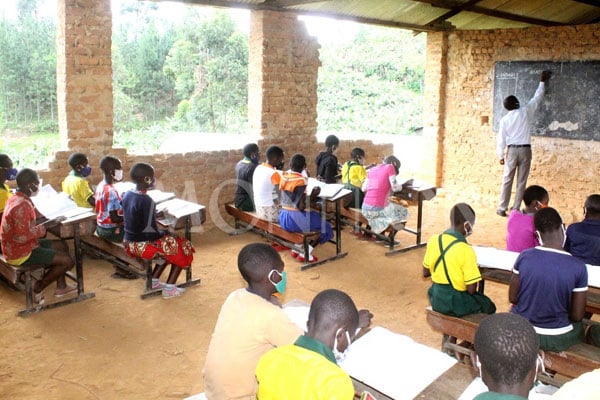We’re too broke to pay our own fees, teachers say

Students attend class at Kabarole Primary School in 2021. PHOTO/FILE
What you need to know:
- Last week, the National Teachers Bill of 2024 was introduced, aiming to reinforce ethical standards within the teaching profession.
Teachers from the Tooro and Rwenzori sub-regions have called on the government to sponsor education for all Grade III teachers to enable them to attain university degrees. They argue that their current meager salaries are insufficient to fund further education.
The 2019 National Teacher Policy mandates that all teachers, from pre-primary onwards, must hold a minimum qualification of a Bachelor’s Degree in Education, which requirement is set to be fully enforced by 2030.
Last week, the National Teachers Bill of 2024 was introduced, aiming to reinforce ethical standards within the teaching profession. The Bill proposes a penalty of Shs14 million for any learning institution that hires teachers without a practicing licence. The Bill, tabled by the State Minister for Higher Education, Mr John Chrysostom Muyingo, stipulates that all teachers in Uganda must register to practice, with a degree in education being a key qualification for registration.
However, during a four-day consultative meeting organised by the Education Policy Review Commission at the weekend, stakeholders from the Tooro and Rwenzori sub-regions expressed mixed reactions. Many teachers, particularly those with Grade III and Grade IV qualifications, highlighted the financial difficulties they face in attaining degrees.
Dr Amanya Mushega, the chairman of the commission, explained that their role is to gather views from stakeholders across the country to compile a comprehensive report with recommendations for the government on areas of success and improvement.
Mr James Tashobya, a teacher, warned that making degrees mandatory could drive many educators out of the profession, especially those in pre-primary education with Grade III qualifications.
“Those teachers without degrees teaching in nursery schools have the necessary skills. If the government insists on this directive, we risk losing them,” he said.
Mr Geresome Muhumuza, a teacher from Kyegegwa District, suggested that if the government requires all teachers to obtain degrees, it should also bear the cost.
“Many teachers can’t afford further education. If the government pays the fees, it would be a welcome relief. Otherwise, we may see early retirements,” he cautioned.
Mr John Kyaku, a teacher from Kyenjojo District, said most schools do not grant study leave to their teachers, unlike other professions, and there is no guarantee of salary enhancements.
“If all teachers were to pursue further studies simultaneously, schools could be forced to close. The government should introduce a policy for study leave and ensure that teachers are compensated according to their qualifications,” he said.
He also criticised the government for rushing the degree requirement without first addressing teachers’ salaries.
“Increasing salaries would have motivated teachers to pursue higher qualifications, knowing they would be compensated fairly afterward,” he added.
Regarding the new curriculum, teachers raised concerns about the lack of preparation. Although students in Senior Four will be examined under the new curriculum this year, many teachers still lack sufficient knowledge to effectively teach it.
Mr Henry Muchuguzi, a teacher from Bunyangabu District, pointed out that universities are still training teachers using the old curriculum, leading to confusion when they are expected to teach the new one in schools.
“The reading materials for the new curriculum are insufficient, and universities are not yet aligned with the new teaching methods. The government must direct these institutions to update their curricula,” Mr Muchuguzi urged.
Kyenjojo District Chief Administrative Officer Asman Masereka warned that despite salary enhancements for science teachers and other health professionals, many are opting for early retirement at age 45, leaving districts with a shortage of civil servants.
He emphasised the need for a staff retention policy, noting that experienced personnel are being lost to the private sector.



